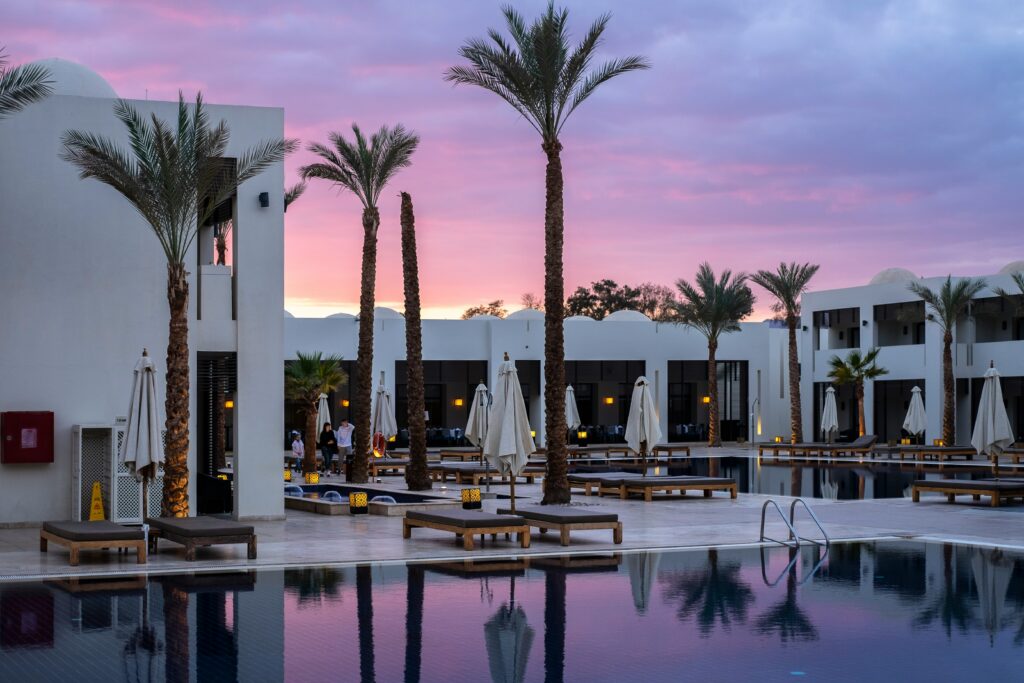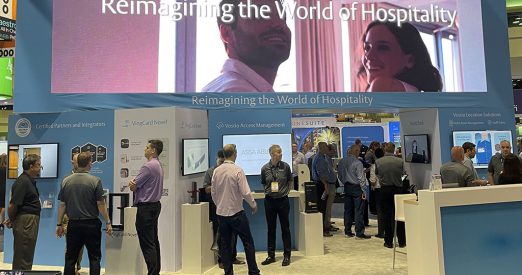
Hospitality Industry Statistics & Trends Operators Need To Know
by The Ottimate Editorial Team
The hospitality industry has changed dramatically in the past few hundred years. We’re all about hotel chains catering to a specific market now. To ensure your hotel’s success, you need to stay on top of hospitality industry statistics to know what your guests want so you can implement changes to handle those expectations.
Without data, you’ll be flying blind to what’s going on in the hospitality world, which could sink your hotel faster than the Titanic.
But not to worry, we’ve got the latest hospitality industry statistics to keep you and your hotel at the top of your game — this guide covers:
- Today’s Hospitality Industry
- Vital Hospitality Industry Statistics and Trends
- Automation Is a Hospitality Industry Trend That’s Here To Stay
- 4 Benefits of Automating Your Hotel’s AP
- Hospitality Industry Statistics Tell a Story
Today’s Hospitality Industry
Hotels today are designed with specific lifestyles and travel occasions in mind — there’s a hotel for everyone and every need:
- Ritz-Carlton — Guests who want luxury accommodations
- Homewood Suites — Extended-stay business travelers
- La Quinta — Budget-conscious travelers
- Embassy Suites — Guests who want the comfort & convenience of 2 rooms

As a hotelier, it’s crucial to stay on top of the latest statistics and trends in the hotel industry to ensure your hotel is ahead of the game in addressing the wants and needs of your guests.
Vital Hospitality Industry Statistics and Trends
“Most of the world will make decisions by either guessing or using their gut. They will be either lucky or wrong.” – Suhail Doshi, chief executive officer, Mixpanel.
The success of your hotel operation simply can’t be left to chance, guessing, or whatever your gut whispers to you.
You’ve got to know what’s going on in your world by understanding hotel industry statistics, analyzing that data, and adapting. So we’ve put together key stats to keep you in the know.
General hospitality industry statistics
The statistics below paint a picture of what’s going on in the hospitality industry and will help you figure out where your hotel fits in.
- There are at least 187,000 hotels in the world and an estimated 17.5 million guestrooms in the world as of 2023. (Condor Ferries, 2023)
- There are 166,272 Hotels & Motels businesses in the US as of 2023, an increase of 7.1% from 2022. (Condor Ferries, 2023)
- The global hospitality industry is worth over $4.548 trillion as of 2022 and is projected to see a CAGR of 7% from 2021 to 2025. (Condor Ferries, 2023)
- The average American hotel generates 65% of revenue from rooms, while 25% comes from F&B and 10% from other outlets. (Hotel Tech Report 2024)
- Hilton, valued at $11.7 billion, remains the world’s most valuable hospitality brand. 2022 was an exceptional year of brand value growth for Hilton, with revenue soaring as both business and leisure travel surged post-pandemic. (Brand Finance, 2023)
- With occupancy levels expected to be relatively flat in 2024, performance gains are once again expected to come almost entirely from ADR, with an expected year-over-year increase in RevPAR of 2.7% — approximately 117% of pre-pandemic level. (PwC, 2023)
Post-pandemic hospitality industry statistics
- More than 670,000 hotel industry operation jobs and nearly 4 million hospitality jobs were lost in 2020 due to the pandemic. (Condor Ferries, 2023)
- The hotel industry lost more than $21 billion in revenue by May 2020. (Condor Ferries, 2023)
- Hotel industry sees gradual return to normality as pre-pandemic travel patterns resume while over half of top 50 hotel brands remain below pre-pandemic values. (Brand Finance, 2023)
- “Revenge travel” was a major driver of demand for two years after COVID-19. In 2021, nearly half of summer travelers said the need for an “escape after lockdowns” motivated them to take trips. In 2022 and early 2023, many said they were “making up for trips I didn’t take due to the pandemic.” But the revenge effect has declined steadily, and by the 2023 holiday season, just 11% said they were making up for missed trips. (Deloitte, 2023)
Digitization and tech integration hospitality industry statistics
As more people get used to facial recognition and fingerprint identification on their laptops and phones, the more digital integration they expect with their hotel experience. As far as digital transformation, “nice to have” doesn’t cut it anymore in the hotel industry. Instead, digitization is necessary to stay ahead of your competition and on track with your growth.

Analysis of the hotel industry has produced some valuable data on this topic for you to review and implement in your hotels:
- Almost 50% of respondents surveyed said that they would be more likely to stay at a hotel with self-service technology that minimizes contact with staff. (Statista 2023)
- About 1 in 10 travelers reported that they used Gen AI to plan their trips, which sounds small until you consider the technology has only been widely available for a year. (Deloitte, 2024)
- 25% of hospitality and leisure CEOs think AI will significantly impact how they operate in the next five years. (PWC 2019)
- Hotels using virtual tours are getting up to a 135% increase in online revenue. (PWC 2019)
- Over 60% of guests surveyed said they’d use voice control technology if present in their room, and almost 70% would use it for in-room amenities like thermostats and light controls. In addition, 67% of guests also want the ability to cast personal content from their own devices to the room’s TV. (Hotel Internet Services 2020)
Millennial travel statistics
Millennials represent the largest generation to date (with Gen Z hot on their tail), making up 31.5% of the world’s population. They’re redefining travel by emphasizing experiences and culture, creating their itineraries, and making travel decisions influenced by social media or user-generated content rather than stock photos.
All of these new travel trends are conducted on their smartphone, from research to booking.
As a hotelier, you need to pay attention to this group and its trends.
- Millennials spent $200 billion on travel in 2018, 33% plan a spending budget of $5000+ on their vacations.
- 66% of millennials book their trip using a smartphone.
- 74% of millennials use their phone for travel research.
- 75% of millennials have installed travel apps on their smartphone, compared with other generations at 47%.
- 69% of millenials had more trips over weekends, compared to different generations at 13%.
- Millennials took 5.6 trips per year, compared with 4.4 (Gen Z), 4.0 (Gen X), and 3.5 (Boomers).
- 97% share travel experiences on social media, with 2 in 3 posting at least once a day during their trip.
- 58% of millennials stated they’d be up for solo travel, and 26% already have.
- 44% of millennials with children have traveled together, of which 62% did so with kids under 5 years old.

Booking stats
Understanding your guests’ booking habits and preferences will help you create hotel booking experiences to accommodate their expectations.
- The average room rate in the US is $120.01. (Condor Ferries, 2023)
- 70% of global travelers are more likely to book eco-friendly accommodation, regardless of whether or not they’re looking for a sustainable stay. (Booking.com, 2019)
- Flights and hotels are booked 12 weeks in advance. (Google, 2019)
- Travelers who book their activities ahead spend 81% more on transportation and 47% more on accommodation. (Google, 2019)
- Most hotel bookings are made at 10 am CET, and the least bookings happen around 6 am CET. (TrekkSoft, 2019)
- In 2018, there were 66.7% direct website bookings, 9.1% marketplace bookings, and 24.3% third-party service bookings. (TrekkSoft, 2019)
Hotel accommodation statistics
- Luxury hotels performed the worst during the pandemic, with only 21% occupancy in December 2020 compared to 68% in December 2019. (U.S. Travel Association)
- On the other hand, economy hotels performed better, with 45% occupancy in December 2020, just 3% below December 2019 (48%). (U.S. Travel Association)
- How do different factors influence hotel choices?
- 41% location
- 39% family needs
- 36% price
- 31% family friend offerings
- 31% room size
- 21% deal/promotion (Expedia Group, 2019)
- 72% of vacation travelers prefer hotel and resort stays over vacation rentals or timeshares, with the top reasons being better amenities (37%), booking ease (33%), onsite bars and dining (31%). (ValuePenguin 2021)
- Once checked in, 90% of millennials connect to the hotel WiFi. (PwC, 2019)
- 58% of family travelers stayed in a hotel on their last trip. On the other hand, 21% stayed in a resort, 17% were hosted by friends/family, and 16% stayed in a vacation rental. (Expedia Group, 2019)
Hospitality industry employment statistics
According to the Bureau of Labor Statistics, the hotel industry has an annual employee turnover rate of 73.8% — that’s more th employee statistics:
- Leisure and hospitality employment increased 4.3% compared to September 2022, the largest gain since January. (U.S. Travel Association, 2023)
- About 10.5 million people are employed in the global hotel and resort industry (Condor Ferries, 2023)
- There are 100,535 businesses within the hotel industry, with more consistently being added to the industry landscape. (Condor Ferries, 2023)
- Immigrants account for 13% of the total US population, but they account for 31% of the total workforce in hotels and lodgings in the US. (Deloitte, 2019)
Automation Is a Hospitality Industry Trend That’s Here To Stay
Automation, by definition, is the use of technology applications that perform repetitive tasks, freeing up employees for higher-value work.
Higher value work — let that sink in.
Many hotels have resisted implementing automation for fear of changing the way things have always been done or for fear of losing quality human touch, an essential aspect in the hospitality industry.
But let’s reframe that idea. When you adapt to changing times and incorporate automation into your hotel operation, you’re encouraging your employees to step up to higher-value work, like serving your guests.
Automation aims to improve efficiency, streamline workflows, and enhance your overall hotel operation. The hospitality industry is already leaning into the benefits of automation with solutions like housekeeping management software and apps for guests.
An automated AP solution for your hotel could lighten your accounting workload significantly while boosting workflow efficiency.
4 Benefits of Automating Your Hotel’s AP
71% of businesses plan to further automate their accounts payable function in 2022, according to IOFM.
Automating your hotel AP is an innovative solution that’ll bring your hotel up-to-date and set you up for success in the future. It comes with some pretty sweet benefits in the here-and-now too:
- Frees up your GM’s time — This may be 1 of the most significant benefit for your hotel. AP automation helps your GM claim back valuable time to focus on operations and guest experiences previously spent on keying in and approving invoices. That circles back to “higher-value work.”
- Streamlined invoice processing — With an AP automation solution like Ottimate, most invoice processing workflow becomes automated. Invoices are digitized, automatically coded, and routed to the correct approver.
- More accurate reporting — Generating reports is easier, faster, and more accurate with automatic GL coding. It also allows for comparing expense categories across multiple properties.
- Real-time expense management — Invoices are scanned in, or you can snap a picture with your phone and upload it. Because invoices are digitized, and automatically GL coded, expenses are applied to categories in real-time, allowing increased oversight of your hotel operation spending.
Ottimate knows the hospitality industry and understands the uniqueness of hotel accounting. Their hotel clients love the streamlined AP workflow that comes with Ottimate.

With Ottimate, the GMs know that they can click on the invoice and see that it was paid. They can actually hover over the page to see the check number, click on the check number, and get a copy of the check. It’s incredible how much time that user-friendliness alone has saved me.
— Kirsten Haley, AP Manager, Golder Hospitality
Hospitality Industry Statistics Tell a Story
Remember, behind the stats are people. Your guests’ satisfaction, your employees’ morale, and your hotel’s success are riding on you paying attention to those statistics and making changes based on them.
Statistics tell the story of what’s important to people and give you the key to the mint in making sure your hotel operation addresses the essentials.
Adapting to change is the key to success. So when you’re ready to bring your hotel’s AP up-to-date with cutting-edge automation, Ottimate is here to serve you. You can also request a demo with us!
Stay up to date on the latest news in AP automation and finance
Related

